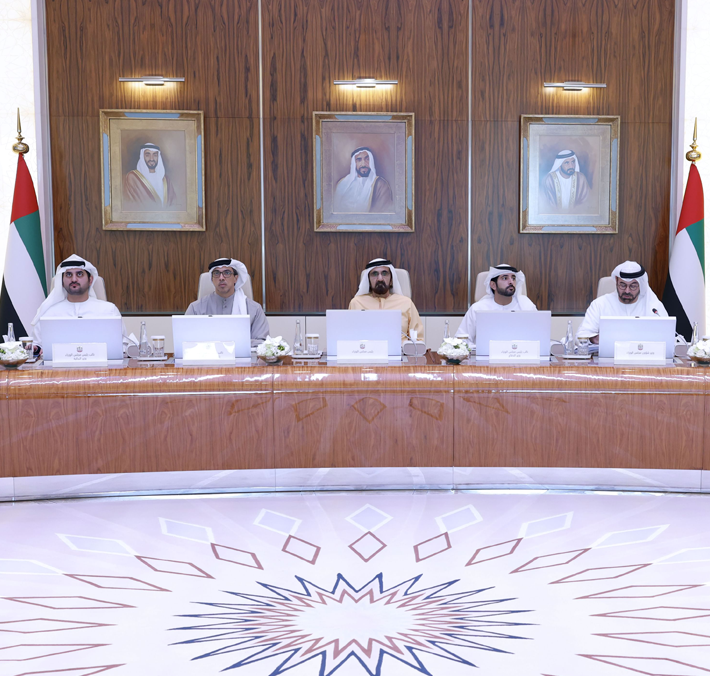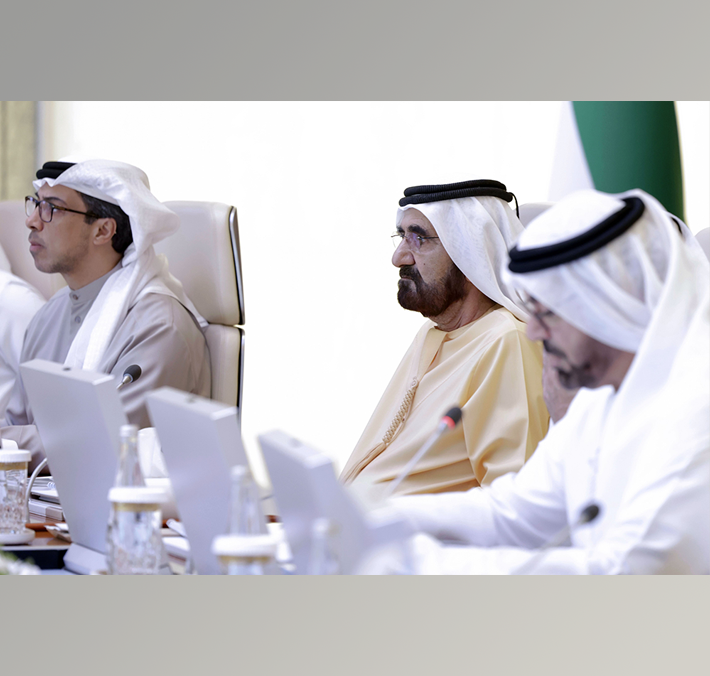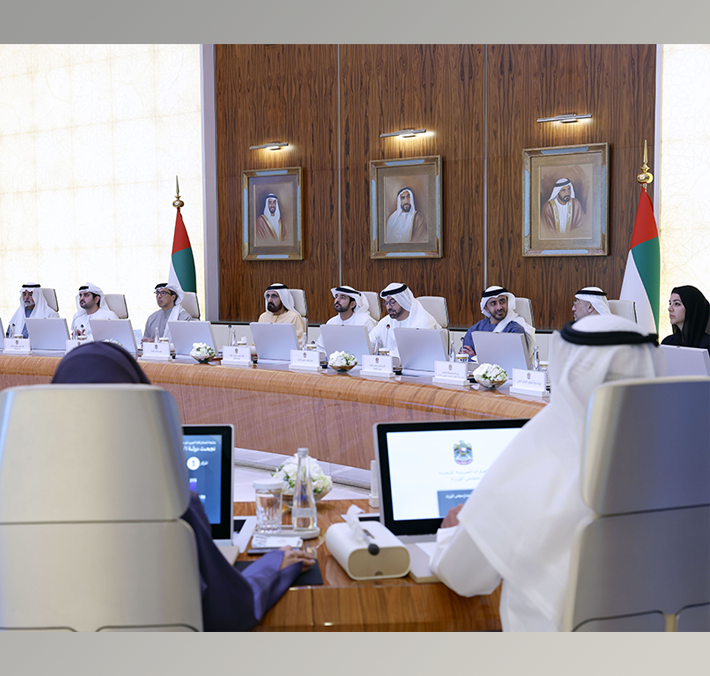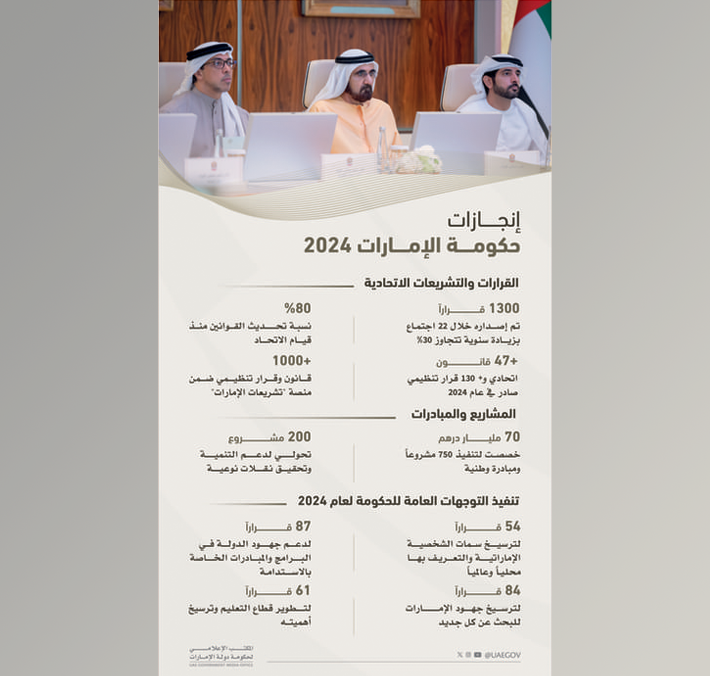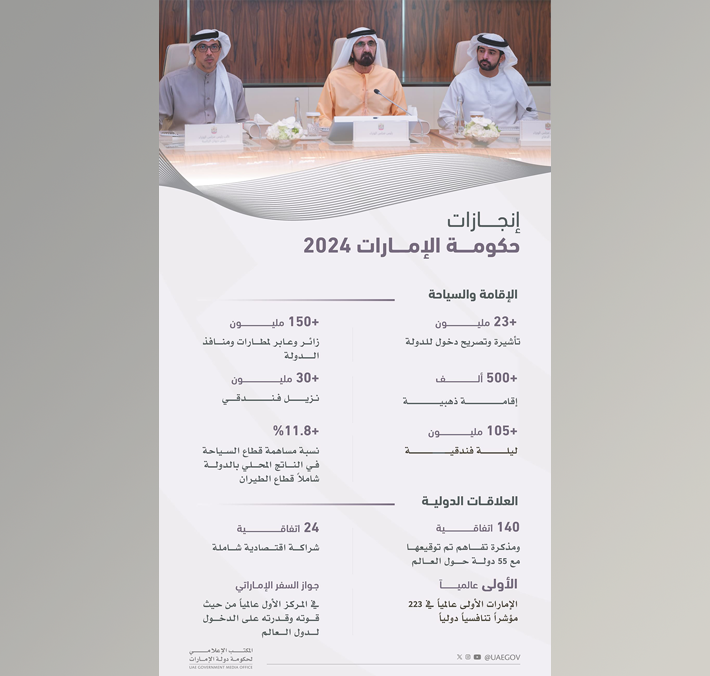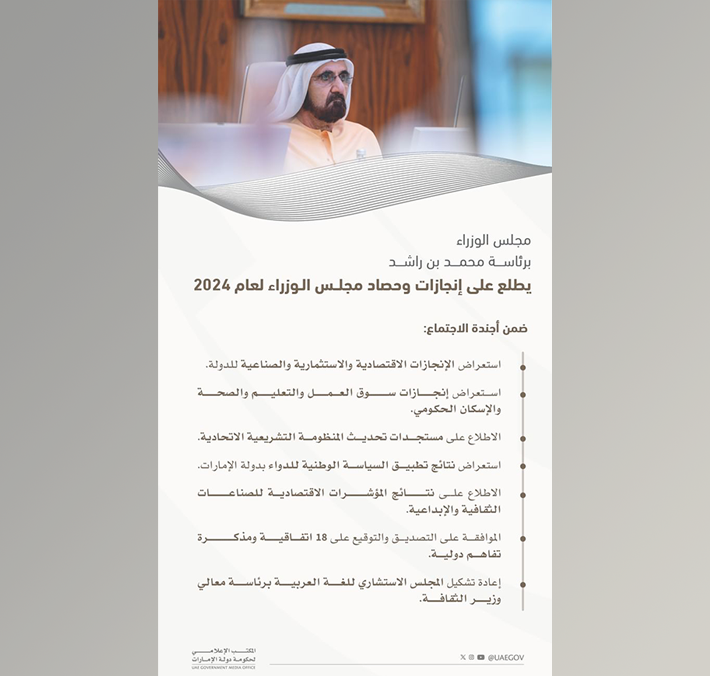Media Center
Mohammed bin Rashid Reviews UAE Cabinet Accomplishments
His Highness Sheikh Mohammed bin Rashid Al Maktoum, Vice President, Prime Minister of the UAE and Ruler of Dubai, has chaired the UAE Cabinet’s first meeting of 2025 at Qasr Al Watan, Abu Dhabi.
The meeting was attended by His Highness Sheikh Mansour bin Zayed Al Nahyan, Vice President, Deputy Prime Minister and Chairman of the Presidential Court; H.H. Sheikh Hamdan bin Mohammed bin Rashid Al Maktoum, Crown Prince of Dubai, Deputy Prime Minister and Minister of Defence; H.H. Sheikh Maktoum bin Mohammed bin Rashid Al Maktoum, First Deputy Ruler of Dubai, Deputy Prime Minister, and Minister of Finance; and H.H. Sheikh Abdullah bin Zayed Al Nahyan, Deputy Prime Minister and Minister of Foreign Affairs.
His Highness Sheikh Mohammed bin Rashid Al Maktoum said, “Today, I chaired the first Cabinet meeting of the new year – a year of prosperity, blessings, growth, and stability for the people of the UAE.”
His Highness Sheikh Mohammed bin Rashid Al Maktoum added, “During the meeting, we reviewed the achievements of 2024, which stands as the most remarkable economic and developmental year in the nation’s history since its establishment. Under the leadership of my brother, the UAE President, our country strengthened its global presence, signing more than 140 international agreements across vital sectors, including the economy, sustainability, clean energy, technology, artificial intelligence, security, defence, and international humanitarian efforts.”
His Highness Sheikh Mohammed bin Rashid Al Maktoum said, “The UAE Government successfully concluded a three-year initiative involving 2,500 officials to update all legislation issued since the Union’s founding. This effort resulted in the modernisation of 80 percent of the country’s economic, social, and regulatory laws, fostering an environment conducive to growth.
"Consequently, the number of new companies established in 2024 surged to 200,000, while foreign trade exceeded AED 2.8 trillion for the first time. Foreign direct investments are projected to reach AED 130 billion, and industrial exports are expected to surpass AED 190 billion – both unprecedented milestones.”
His Highness Sheikh Mohammed bin Rashid Al Maktoum added, “In the same year, our airports welcomed 150 million passengers, and our hospitality sector hosted over 30 million guests. Emirati youth launched 25,000 small and medium-sized enterprises, integrating seamlessly into the national economy. Additionally, Emirati participation in the private sector grew by 350 percent, with 131,000 citizens employed in this sector for the first time, driven by the Nafis programme.”
His Highness Sheikh Mohammed bin Rashid Al Maktoum said, “The UAE Government also launched more than 750 national projects and initiatives to advance development, attract top talent, and secure investment. Furthermore, the Cabinet and the Ministerial Development Council issued 1,300 decisions to establish the best regulatory environment for accelerating growth over the next two decades.”
His Highness Sheikh Mohammed bin Rashid Al Maktoum concluded, “As we embark on this new year, the UAE Government reaffirms its commitment to the President, the people of the UAE, all residents, and everyone who believes in our development model. We will continue on the path of progress, openness, and modernisation, ensuring the most favorable business environment and the highest quality of life for all… What lies ahead in 2025 promises to be even greater, better, and more inspiring."
The UAE Cabinet reviewed its 2024 performance, guided by President His Highness Sheikh Mohamed bin Zayed Al Nahyan's directives, which served as the federal government's roadmap for 2024. These directives prioritised strengthening the Emirati identity globally, pursuing innovation, supporting national sustainability programmes, and developing the education sector.
During 2024, the Cabinet issued over 1,300 resolutions over 22 meetings. The federal government allocated approximately AED 70 billion to implement nearly 750 national projects and initiatives, including over 200 transformative projects designed to significantly advance key development sectors.
The UAE federal government prioritised strengthening national identity, enacting 54 resolutions that included approving a federal cultural heritage law, launching a national initiative for culture and creativity, adopting the National Youth Agenda 2031, and announcing the National Policy for the Preservation of Modern Architectural Heritage.
The UAE also hosted and participated in international cultural events and conferences, further promoting Emirati identity globally, hosted the World Conference on Culture and Arts Education and signed several international MoUs linked to cultural cooperation.
Demonstrating its continuous commitment to innovation, the UAE joined the international Lunar Gateway space station project, alongside the USA, Japan, Canada and the European Union. It also became the first Arab nation with a permanent polar research base.
The government also launched a pioneering "Zero Government Bureaucracy" programme to streamline procedures. Over 84 national legislation and initiatives fostered progress in strategic and emerging sectors, with technology and AI receiving significant attention. The government approved over 40 related projects, legislation, initiatives, and international agreements to attract top talent, companies, and investments.
During the Year of Sustainability 2024, the UAE government continued its commitment and efforts in this area, enacting over 87 policies, initiatives, and regulations in 2024. Key actions included launching “Plant the Emirates” national programme, enacting a federal law on the Reduction of Climate Change Effects, adopting the National Policy on Biofuels, establishing the General Framework for Adopting Sustainable Digital Transformation, hosting the World Food Security Summit, and participating in international environmental and sustainable development events.
The UAE also signed several international agreements and MoUs supporting renewable energy, hydrogen and energy strategies, the circular economy, and biodiversity.
Prioritising education as a critical sector, the UAE government restructured its approach, encompassing early childhood and family development through higher education, training, and empowerment for future workforce leaders. This restructuring included establishing the Ministry of Family and the Ministry of Higher Education and Scientific Research, along with reorganising the Education and Human Resources Council, the Ministry of Education, and the Ministry of Community Empowerment.
Reinforcing its commitment to education as the foundation for comprehensive development, the government implemented numerous supporting policies and programmes. Key measures included a new framework for classifying higher education institutions, a scholarship-based funding system for federal universities, innovative management models for schools incorporating advanced educational concepts, hosting the Special Olympics Global Centre Summit, and confirming the UAE as the host of the 2025 Emirates Conference on Medical Education.
Furthermore, several international agreements and MoUs were signed to facilitate the exchange of best practices and enhance educational systems.
The UAE's robust education system currently serves over 1.2 million students across 1,325 public and private schools and educational institutions. This year saw the addition of over 20 new public and private schools, providing capacity for over 23,000 more students. The UAE is also home to over 107 public and private universities and higher education institutions, with a student population exceeding 200,000, including over 96,000 international students.
Guided by President His Highness Sheikh Mohamed bin Zayed Al Nahyan, with support from His Highness Sheikh Mohammed bin Rashid Al Maktoum, Vice President, Prime Minister and Ruler of Dubai, and overseen by His Highness Sheikh Mansour bin Zayed Al Nahyan, Vice President, Deputy Prime Minister and Chairman of the Presidential Court, the "NAFIS" initiatives and Emiratisation policies achieved significant success, over 131,000 Emirati citizens entered the workforce for the first time, a dramatic increase from the 29,000 Emirati nationals employed prior to the programme's launch, representing a growth of approximately 350 percent in Emirati private sector participation. Besides, policies and initiatives fostering entrepreneurship and supporting SMEs resulted in over 25,000 new companies fully owned by Emirati citizens, entering the economic sector.
Recognising family stability as a critical priority, the federal government empowered Emirati families through the Sheikh Zayed Housing Program. In 2024, the programme issued over 5,600 housing approvals, a substantial increase from the previous annual average of 2,000. The total value of these approvals reached AED 4 billion, significantly exceeding the average of AED 1.6 billion in prior years.
To modernise its legal framework, the UAE federal government updated over 80 percent of its laws enacted since the foundation of the Union in 1971. In 2024, over 2,500 officials from federal, local, and private sector entities, across 215 specialised national teams, issued and updated over 47 federal laws and more than 130 regulatory resolutions.
Supporting this is the "UAE Legislation" platform, a digital repository of over 1,000 federal laws and resolutions, attracting 500,000 monthly visits (over 40 percent of them are international) and linked to local government platforms for seamless access.
Future efforts will be focused on measuring the impact of these legislation and laws on all national sectors in the country, developing a global model to measure the impact of legislation, and highlighting the country’s efforts and readiness in this field globally, with the introduction of artificial intelligence in developing and analysing the impact of legislation.
Continuing its focus on global economic partnerships, the UAE finalised Comprehensive Economic Partnership Agreements (CEPAs) with 12 nations in 2024, reaching a total of 24 agreements, with 15 signed and 9 to be announced soon.
The UAE's GDP is projected to exceed AED 1.7 trillion for the first time, with foreign trade surpassing AED 2.8 trillion. Non-oil exports are expected to exceed AED 540 billion, imports over AED 1.6 trillion, and re-exports over AED 700 billion.
Foreign Direct Investment (FDI) is projected to reach AED 130 billion, up from AED 111 billion in 2023, maintaining the UAE's first-place regional ranking and 11th globally.
Local economic development departments and free zones, supported by the Ministry of Economy, issued over 200,000 new economic licenses in 2024. The UAE's unified economic register now lists nearly 1.1 million registered businesses.
The industrial sector contributed over an estimated AED 210 billion to the GDP, with industrial exports exceeding AED 190 billion. This success is driven by over 15,000 companies providing products and services, employing over 11,000 Emirati citizens.
As part of the UAE's commitment to providing suitable employment opportunities, a high quality of life, streamlined services, and an optimal business environment to attract investment, talent, and top-tier services, the modernised visa and entry permit system issued over 23 million visas and entry permits in 2024.
Over 150 million visitors passed through UAE ports and airports of the country. Preliminary national estimates indicate unprecedented success in tourism and culture, with over 30 million hotel guests in 2024, resulting in over 105 million occupied hotel nights and placing UAE hotel occupancy rates among the highest globally.
Reinforcing the UAE's international presence, the Cabinet approved joining and ratifying 140 international agreements and MoUs with over 55 countries and specialised organisations. These agreements span various sectors, including economy, finance, investment, artificial intelligence, advanced technology, environment, sustainability, climate change, clean energy, taxation, justice, security, defence, aviation, and humanitarian work.
The Cabinet also approved hosting numerous international conferences and events in the UAE, and the establishment of regional headquarters for several international organisations focused on delivering humanitarian and social programmes globally.
The UAE Cabinet reviewed the progress of implementing the National Drug Policy. From 2018 to 2023, medicine sales increased by an average of 11.1 percent annually. Sales are projected to reach AED 20.5 billion in 2024, AED 21.8 billion in 2025, and AED 26.4 billion by 2028.
National pharmaceutical manufacturers' sales totaled AED 862.3 million in 2023, representing 4.4 percent of the domestic market and an 8.9 percent increase over 2022. The number of medical product factories increased by 90 percent between 2018 and 2024, while locally manufactured and approved medical products rose by 120 percent, from 720 in 2010 to 1,925 in 2023.
Locally manufactured pharmaceuticals grew from 19 percent of the total market in 2018 to 23 percent in 2023. Pharmaceutical personnel increased from 11,827 in 2019 to 16,263 in 2023, and pharmacies from 3,111 to 4,359 (a 40 percent increase).
Pharmaceutical patents rose from 166 in 2017 to 536 in 2023, reaching a cumulative total of 2,213.
To further diversify the national economy, the UAE Cabinet reviewed 2022 economic indicators for cultural and creative industries, including press and literature, music, theatre and opera, photography, software, databases, visual arts, graphic design, film equipment, clothing, textiles, footwear, jewellery, coins, and interior design.
The sector contributed 4.1 percent to the national GDP, growing 24.4 percent annually from AED 61.3 billion in 2021 to AED 76.2 billion in 2022. Employment in the sector reached 522,873, a 25.6 percent annual increase. The number of cultural and creative establishments reached 65,801, and the total value of related exports reached AED 63.8 billion.
In international affairs, the UAE Cabinet approved ratification of agreements with Australia on a comprehensive economic partnership, with Türkiye on reciprocal investment promotion and protection, and with Bahrain on avoiding double taxation on income and preventing tax evasion. A protocol amending the double taxation avoidance agreement with Switzerland was also ratified.
The Cabinet also approved signing MoUs between the UAE Ministry of Energy and Infrastructure and counterparts in the US and Kenya on energy cooperation, with Portugal on electric mobility, and with Argentina on investment in the mining sector. Further MoUs were approved between the UAE Ministry of Higher Education and Research and Paraguay on higher education and research, and between the UAE and the Philippines on improving government operations.
The Cabinet also approved MoUs between the UAE Cyber Security Council and the Ethiopian Artificial Intelligence Institute and the Dominican Republic's National Cybersecurity Center. An MoU between the UAE National Center of Meteorology and the Bulgarian Antarctic Institute on Antarctic research was also approved.
Negotiations were authorised between Zayed University and Canada's International Business University regarding academic partnership, and on a trilateral strategic partnership framework for energy and infrastructure between the UAE, Albania, and Italy. Several other agreements and MoUs aimed at strengthening the UAE's global position were also approved.
The Cabinet also reviewed the results of hosting several international conferences and events, including the IEEE International Conference on Application of Information and Communication Technologies, the 8th International Symposium on Flash Floods in Wadi Systems, the Gulf4 International Conference on Sustainable Management Gulf Ecosystem Health under Climate Change, the 15th Conference on Undergraduate Research on Applied Computing, the Explorance Bluenotes MENA Conference, and the Cryptocurrency Research Conference 2024 among others.
In legislative affairs, the Cabinet approved drafting a federal law concerning the National Zakat Platform. Several executive regulations and regulatory decisions were also approved, including regulations for Federal Decree -Law No. 41 of 2023 (on regulating the accounting and auditing profession) and Federal Decree-Law No. 36 of 2023 (on regulating competition), along with a Cabinet decision on percentages related to the application of the competition law.
Further decisions addressed the human resources and financial system for employees of mosques under the General Authority of Islamic Affairs and Endowments (Awqaf), and the technical regulations for non-tobacco nicotine pouches.
In governmental affairs, the Cabinet approved the reconstitution of the Arabic Language Advisory Council, chaired by the Minister of Culture. The final accounts of the General Pensions and Social Security Authority for the 2023 fiscal year and its budget for 2025 were approved.
The Cabinet also reviewed updates on the cashless government project, the 2024 annual report on the Energy Service Companies (ESCO) market regulatory framework, and the performance report of the Emirates Investment Authority from 1st January to 30th September 2024.


